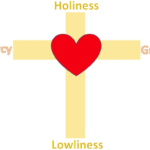So the Lord said, “I will blot out man whom I have created from the face of the land, man and animals and creeping things and birds of the heavens, for I am sorry that I have made them.” But Noah found favor in the eyes of the Lord. These are the generations of Noah. Noah was a righteous man, blameless in his generation. Noah walked with … [Read more...] about Genesis – The State of the World
Uncategorized
The Word Became Flesh
In the beginning was the Word, and the Word was with God, and the Word was God...And the Word became flesh and dwelt among us, and we have seen his glory, glory as of the only Son from the Father, full of grace and truth. John 1:1,14 It was the moment that all of Creation had been racing toward since our Creator first spoke … [Read more...] about The Word Became Flesh
The Message of the Cross
For the word [message] of the cross is folly to those who are perishing, but to us who are being saved it is the power of God.1 Corinthians 1:18 In today's world we are inundated with religious imagery, but all meaning seems to be lost in presentation. And no imagery is more powerful, yet so misrepresented as the image of … [Read more...] about The Message of the Cross


